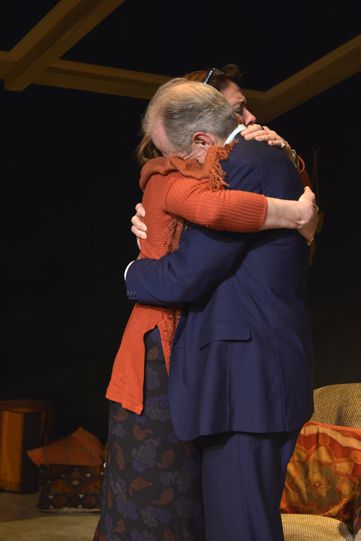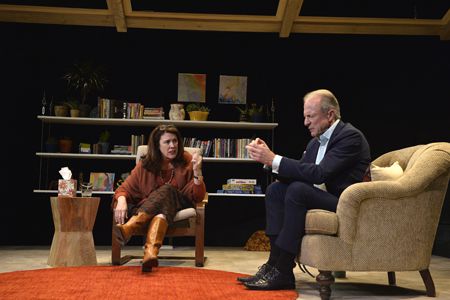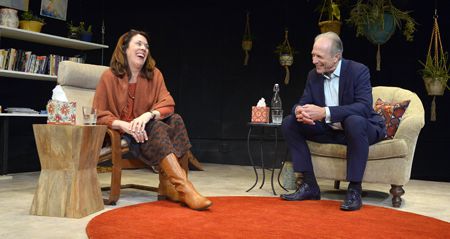Play (2008)
by Anat Gov
Translated by Anthony Berris
Directed by Guy Ben-Aharon
Israeli Stage
Arsenal Center for the Arts, Watertown, MA
April 14-30, 2016
Scenic Design: Cristina Todesco; Sound Design: Darby Smotherman, Skylar Burks
With Will Lyman (God), Maureen Keiller (Ella)

Will Lyman as God
in “Oh, God”
Photo: Paul Marotta
Courtesy of Israeli Stage
God (Will Lyman) walks into the office of psychotherapist Ella (Maureen Keiller), seeking a single session of therapy. He’s obviously distraught and says that, without figuring out something important, things will take an awful turn. They sit down and, as Ella draws him out, God speaks and emotes quite personally. He’s not the God, Almighty we’ve usually expected, and something in his newly vulnerable demeanor catches Ella by surprise and makes her reconsider her own disavowal of faith.
What a funny and charming play this is, and how well-executed on its fairly straightforward but ingenious motivating idea.
How would it actually sound to draw God out, not as the authority-of-all, but as a vulnerable patient seeking help? It’s a great setup and the play pulls it off with a kind of humor that is compelling and spontaneous, and does not feel like schtick or gag-writing that is full of intentional set-ups for punch lines.

Will Lyman as God
in “Oh, God”
Photo: Paul Marotta
Courtesy of Israeli Stage
Written by the celebrated late Israeli female playwright, Anat Gov, the play is full of allusions from the Hebrew Scriptures, though the God who presents himself is not intended specifically as the Jewish one.
Will Lyman, who plays God, is so built for the role it’s kind of uncanny. At once he is supremely dignified and restrained (in a good way), but also capable of releasing himself in such moments of vulnerability that the contrast is quite striking. He did the same for the leading role in King Lear last summer in the excellent production on the Boston Common by the Commonwealth Shakespeare Company, and here distills that capacity for grandeur and subsequent emotional exposure onto a smaller scale, but still with indelibly moving consequences.
Maureen Keiller, who plays Ella, a psychotherapist with an autistic child whose faith in God has waned, also brings a quiet dignity to her role while at the same time demonstrating a wonderful combination of professionalism, incredulity, and vulnerability.
Both Keiller and Lyman have performed numerous staged readings of Oh, God together, and this beautifully and thoughtfully executed fully-staged production reveals the evolving care with which they and director Guy Ben-Aharon, the founder and Producing Artistic Director of Israeli Stage, have developed the play.
There are so many funny lines, it’s only possible to give a taste of the tenor of the humor.
When Lyman’s character shows up in Ella’s office and she asks who he is, he responds I am that I am, a line right out of the Hebrew Scriptures that in the present context also becomes a great one-liner. When she asks what he does, he answers that he’s an artist – priceless! After being repeatedly so elusive and suspicious, she begins to wonder out loud whether he’s from the Mossad, the Israeli CIA. When she asks about his father and mother, he says he had none – all of it very true, very straightforward, and given the setup, quietly very funny. And when he says finally I can’t tell you who I am, she responds by asking simply how long have you felt this way? Hysterical! It’s all great, and one line follows another in rapid succession.
At the same time all of these funny interchanges are occurring, there is a prevailing sense of drama provided by the underlying awareness of the tragic presence of a ten-year old son who can’t or won’t speak and the feeling that Ella consequently has lost a crucial sense of faith in the world.
That God has come to Ella’s office for an hour, offering a sense of the gravity of what’s at hand, signals the importance of coming to terms with an impending loss of faith in the midst of tragedy, but also in the midst of a contemporary secularism that finds the God of the Scriptures out of tune with current, and sometimes very personal, need. The suggestion of dialogue with God as the opening of a rapidly closing channel addresses that demand for renewed intimacy and for the recharging of a relationship that can only emerge from engagement and interaction.

from “The Creation of Adam” (1508-12)
Sistine Chapel, Vatican, Rome
This commitment to an engagement and dialogue with God is evoked clearly in the play through its considerable attention to the Book of Job. In the contemporary context, that interest in dialogue with the source of one’s being is underscored by the philosopher Martin Buber whose signal idea is the notion of the I-Thou relationship. The commitment to pursue an I-Thou relationship with God, and in analogical form with other people, represents, as does the suggestive dialogue in Oh, God, the need to bring meaning home. One thereby seeks to have it emerge from one’s own questioning voice, not to leave deep speculation to some distantly objective I-It formulation, as Buber calls it, which abandons that sense of personal urgency and involvement.

Job (c. 1503)
from the Jarbach Altarpiece
Without being at all heavy-handed, the interchange of seriousness and humor in Oh, God and its suggestion of similar Buberian themes, is deftly woven together in this play and is, as well, a great tribute to the Jewish oral and literary traditions which have at once wrestled with cosmic ideas but have frequently done so with a down-to-earth sense of humor close at hand.
Oddly, there’s a touch of the flavor of the great Frank Capra film It’s A Wonderful Life (1946) in this play – both humorous attempts to speak of the need, in whimsical though thoughtful metaphysical setups, that God has for people who can develop some sense of what faith might be, as well as of the need that people might have for a God that seems accessible and appealingly understandable.
The play is quite short – a little over an hour and a half without intermission – but its effect is pointed and concise, while remaining moving and feeling significant.
Contributing to the overall deftness of the production, the setting by Christina Tedesco is evocative without being overwhelming, giving a sense of the intimacy of a shrink’s office while seeming open to the world somehow. Subtly executed sound design by Darby Smotherman and Skylar Burks gives the merest hints of the chirping of birds, an indication that the office looks out onto a garden. It provides a delicate but persuasive touch.
Israeli Stage has made a point of using performances to stimulate interesting and elongated discussions between audiences and arrays of guests to draw them out. The night I saw the play there was a talk-back featuring writer and philosopher Rachel Newberger Goldstein and her husband, research psychologist Steven Pinker. Goldstein, author of the recent novel Thirty-Six Arguments For the Existence of God: A Work of Fiction (2010), was raised as an Orthodox Jew but is now, as is her husband, a dedicated secularist. Both spoke articulately about their sense of what dialogue between a posited God and a psychotherapist might signify, and Pinker, seemingly with great joy, told one related Jewish-God joke after another. It was fun and drew out a considerable number of audience responses, fulfilling the desire of Israeli Stage to be both a dramatic and educational venture.

Will Lyman as God
in “Oh, God”
Photo: Paul Marotta
Courtesy of Israeli Stage
Representing the culmination of Israeli Stage’s season devoted to the works of female playwrights, Oh, God is its first fully-staged independent production. In addition to their many independent staged readings, they had formerly, in association with ArtsEmerson, produced a fully-staged production of Ulysses on Bottles (2015). This new, independent production is evocative, thoughtful and beautifully done, a maiden voyage of sorts for an emerging Boston-area theater that shows great promise with each step forward.
– BADMan
Leave a Reply